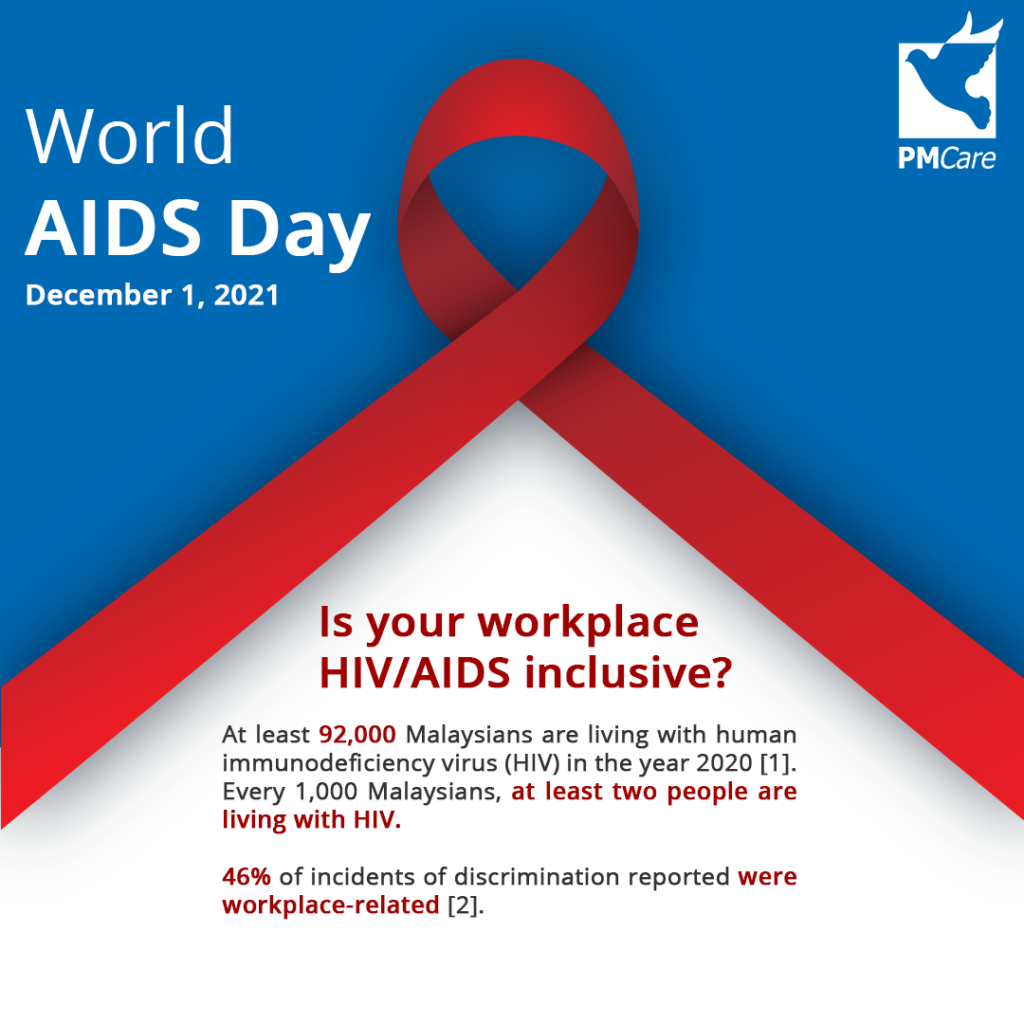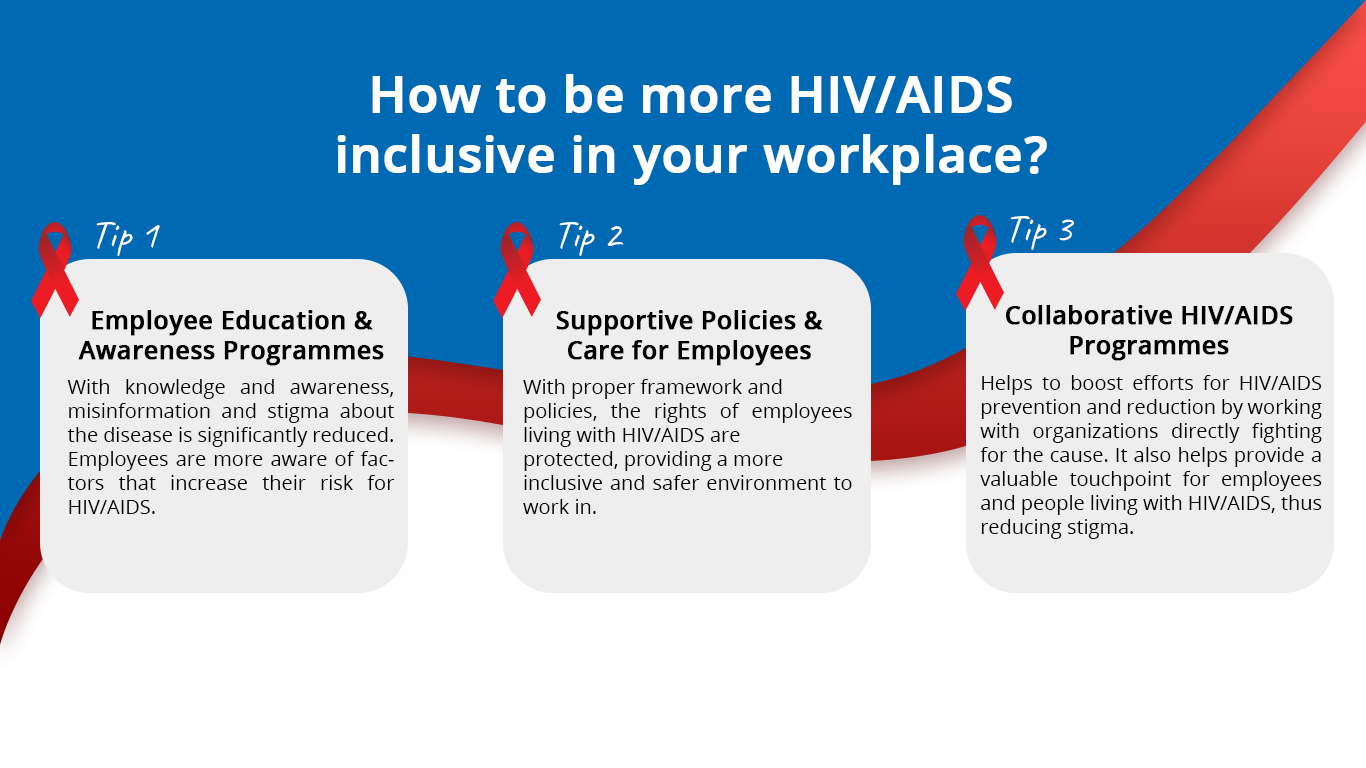World AIDS Day: Is Your Workplace HIV/AIDS Inclusive?
World AIDS Day is held annually on December 1, where the global community commemorates the fight for the HIV/AIDS community and those who had lost their lives to it. A day filled with red ribbons, a symbol signifying the boldness in advocating for the fight for HIV/AIDS community.

HIV/AIDS is still a problem in Malaysia.
It is estimated that at least 92,000 Malaysians are living with human immunodeficiency virus HIV in the year 2020, according to the UNAIDS 1. This means that for every 1,000 Malaysians, at least two people are living with HIV. With the current stigma on HIV, this number may be higher as many Malaysians still fear getting voluntarily tested for HIV. Lack of support system and stigma are often the challenge for Malaysians going for HIV screening, according to a small 2016 study [2].
For people living with HIV/AIDS, work may be one of the challenges in getting screened and treated. In 2019, 46% of incidents of discrimination reported to the Malaysian AIDS Council MAC were workplace-related. There’s a significant need for workplaces to start looking into becoming more HIV/AIDS inclusive.
First things first, what is HIV/AIDS?
HIV and AIDS are often used interchangeably, but it is essential to know that it is not the same. HIV is a virus that attacks white blood cells called T-helper cells, vital cells that help the body fight off infections [3]. Over time as the infection progresses, the body’s immune system is weakened. The person will then be vulnerable to opportunistic infections from other bacteria or viruses. If left untreated, it will then progress into AIDS (acquired immunodeficiency syndrome), the advanced stage of HIV infection. This is when the body’s T-helper cells are below a certain level, and the body’s immune system is considered severely damaged.
Here are some ways to show solidarity and support for people living with HIV/AIDS community!

● Education and Awareness of HIV/AIDS.
This is an effective method in reducing the number of HIV/AIDS cases and the stigma surrounding it. An organisation typically employs a diverse workforce of different backgrounds; some employees may be vulnerable to HIV infections or know someone living with HIV. Educating employees on HIV/AIDS significantly reduces misinformation and stigma about the disease, making the workplace a more comfortable and safer environment for staff living with HIV/AIDS. This will pay off in the future as policies or employee education programs for HIV/AIDS will be more effective. Informed employees will practice safer behaviours that minimise their risk for HIV/AIDS.
● Setting supportive policies and care for staff with HIV/AIDS.
Ensuring policies helps protect people living with HIV/AIDS, providing employees with a supportive and inclusive workplace. This includes a framework for reporting destructive behaviours or work benefits for staff living with HIV/AIDS, such as extended medical leave for doctor appointments. It is also essential that the privacy of staff living with HIV/AIDS is protected. Their HIV status should be kept strictly confidential and only revealed by them with their consent. For better HIV/AIDS inclusive policies, it is strongly encouraged to include staff living with HIV/AIDS for their input in policymaking.
● Collaborative HIV/AIDS programs
An excellent way to show up for the cause is to open volunteering programs for employees to join local groups advocating for people living with HIV/AIDS. Collaborations with your organisation and local HIV/AIDS group helps boost the impact and give your employees valuable interaction with the affected community. This improves the stigma and understanding surrounding those living with HIV/AIDS.
World AIDS Day is a day focusing on respect and equality for everyone. Whether you are living with HIV/AIDS or not, we can start with the red ribbon, and beyond by empathising and supporting people with HIV/AIDS through our daily actions.
Reference:
- Malaysia [Internet]. unaids.org. 2021 [cited 25 November 2021. Available from: https://www.unaids.org/en/regionscountries/countries/malaysia
- Ahmed SI, Syed Sulaiman SA, Hassali MA, Thiruchelvam K, Hasan SS, Lee CK. Attitudes and barriers towards HIV screening: A qualitative study of people living with HIV/AIDS PLWHA in Malaysia. J Infect Prev. 2017;185:2427.
- Walker B, McMichael A. The T-cell response to HIV. Cold Spring Harb Perspect Med. 2012;211:a007054.

